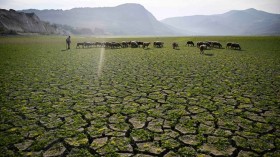High elevation environments such as mountains may be warming much faster than previously thought, according to new research.
"Elevation-dependent warming is a poorly observed phenomenon that requires urgent attention to ensure that potentially important changes in high mountain environments are adequately monitored by the global observational network," researchers from the Mountain Research Initiative Working Group, who were involved in the study, said in a statement.
Lofty mountains are extremely important because they are a major water source for many people living at lower elevations. If these elevated environments are warming up, it could potentially result in disastrious social and economic consequences.
"This alone requires that close attention be paid to the issue. In addition, mountains provide habitat for many of the world's rare and endangered species, and the presence of many different ecosystems in close proximity enhances the ecological sensitivity of mountains to environmental change," the researchers added.
Unfortunately, records of weather patterns at high altitudes are "extremely sparse," with very few weather stations located above 14,700 feet (4,500 meters). Not to mention long-term data, which is crucial for detecting weather patterns, doesn't yet exist above 16,400 feet (5,000 meters) anywhere in the world. The longest observations above this elevation are from the summit of Kilimanjaro, the highest mountain in Africa, standing at about 19,000 feet (~6,000 meters) high.
So how exactly do they know that mountains regions are even warming up? The most compelling evidence comes from the Tibetan plateau, where temperatures have risen steadily over the past 50 years and the rate of change is rapidly accelerating.
"There is growing evidence that high mountain regions are warming faster than lower elevations and such warming can accelerate many other environmental changes such as glacial melt and vegetation change, but scientists urgently need more and better data to confirm this. If we are right and mountains are warming more rapidly than other environments, the social and economic consequences could be serious, and we could see more dramatic changes much sooner than previously thought," explained lead author Nick Pepin of the University of Portsmouth, UK.
So to better understand what may being occurring on high mountaintops, the international research team reviewed elevation-dependent warming mechanisms - including loss of snow and ice, increased latent heat release at high altitudes, and low-elevation aerosol pollutants, which increase the difference in warming rates between low and high elevations.
Despite this data, the researchers argue that much more has yet to be learned of mountain temperature trends and mechanisms - a feat, they say, that can only be achieved with improved observations, satellite-based remote sensing and model simulations.
The findings were published in the journal Nature Climate Change.
For more great nature science stories and general news, please visit our sister site, Headlines and Global News (HNGN).
© 2024 NatureWorldNews.com All rights reserved. Do not reproduce without permission.





